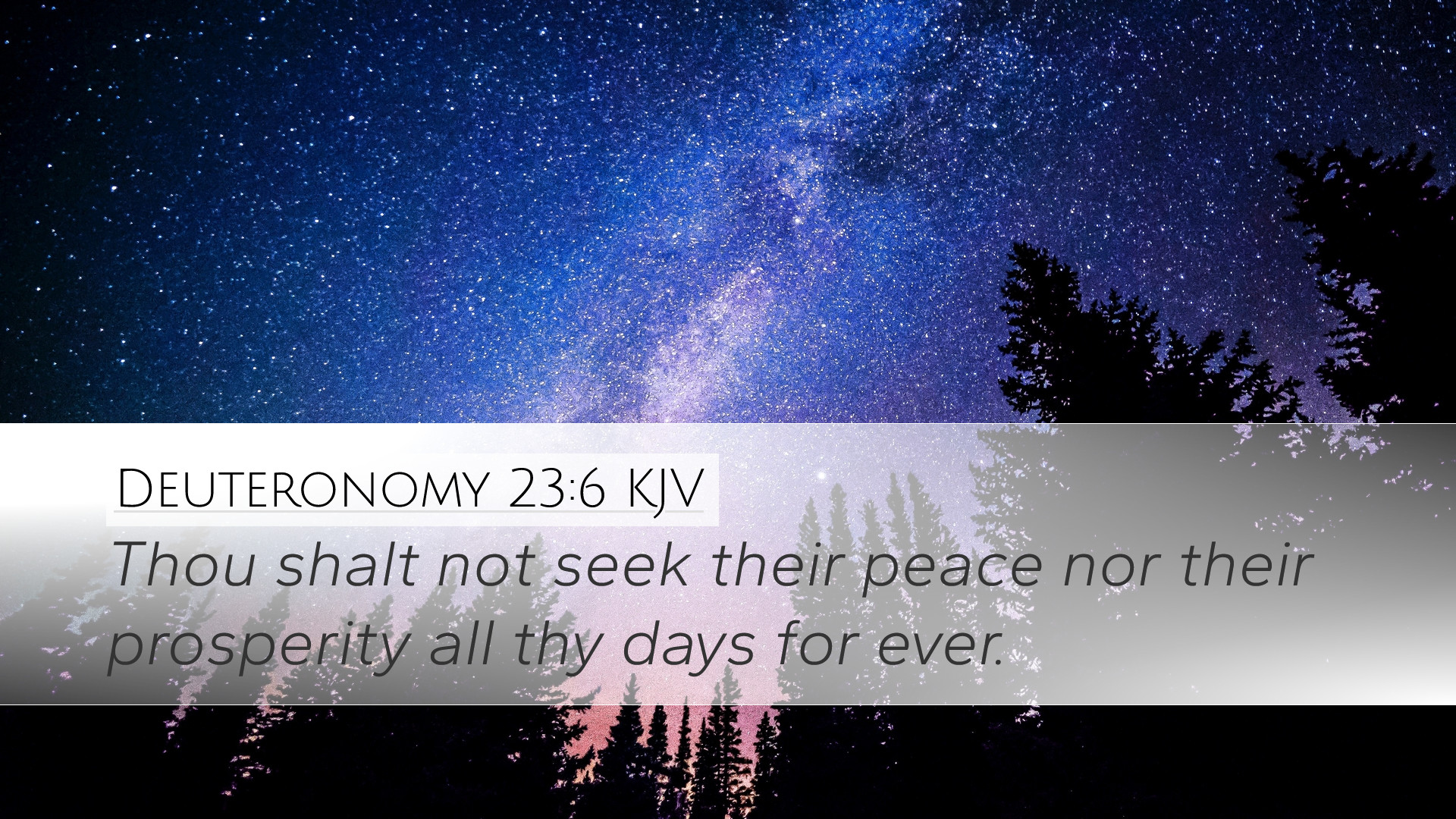Commentary on Deuteronomy 23:6
Verse Text: "Thou shalt not seek their peace nor their prosperity all thy days for ever."
This verse forms part of the broader legal and moral framework within the Book of Deuteronomy, emphasizing the separation of Israel from foreign nations, particularly those who have historically opposed or sought to undermine them.
Contextual Background
The original audience of Deuteronomy consists of the Israelites preparing to enter the Promised Land. This verse demands vigilance in maintaining their distinct identity and faith, especially concerning those historically viewed as adversaries, namely the Edomites and Egyptians.
Theological Insights
Commentators including Matthew Henry, Albert Barnes, and Adam Clarke provide layered understanding of this verse.
-
Matthew Henry:
Henry notes the gravity of seeking peace with historical enemies. He emphasizes that genuine peace cannot be negotiated with those who align against God's purpose. To seek their prosperity is akin to compromising one's moral and spiritual integrity.
-
Albert Barnes:
Barnes expounds on the repercussions of seeking peace with these nations. He cautions against forming alliances that could dilute faith and lead Israel into practices contrary to Yahweh. The prohibition aims to safeguard Israel from moral and spiritual corruption.
-
Adam Clarke:
Clarke remarks on the emotional and spiritual implications of this command. He elaborates that the call to avoid seeking peace underscores a commitment to God’s sovereignty and highlights the dire consequences of turning to those who do not share the same faith and covenant.
Examination of 'Peace' and 'Prosperity'
The terms 'peace' and 'prosperity' in this context demand careful interpretation. They refer not merely to the absence of conflict but also to a holistic welfare—spiritually, emotionally, and physically. The Israelites are warned that any efforts to foster goodwill with their adversaries could undermine their covenant with God.
Application for Today
This verse presents significant challenges for contemporary believers:
-
Covenantal Integrity:
The Israelites were called to maintain a holy separation that directly applies to Christians today. Believers must navigate relationships with those outside the faith with discernment and caution.
-
Understanding the Nature of Alliances:
In practical terms, Clarke's observations urge Christians to evaluate partnerships and associations to ensure they do not compromise their beliefs or lead them astray.
-
Challenges of Modern Relationships:
Henry’s insights remind the faithful to carefully consider interactions that might move them toward syncretism or moral compromise, reflecting on how these relationships affect one's walk with God.
Historical Context
This commandment is set against the backdrop of Israel's tumultuous relationship with nations like Edom and Egypt:
-
Edomites:
The Edomites, descendants of Esau, were often at odds with Israel. Historical conflict arose from jealousy and rivalry. Thus, seeking their 'peace' would connote a betrayal of the covenantal allegiance to God.
-
Egyptians:
The Egyptians symbolized oppression and bondage for the Israelites. Their historical subjugation by Egypt sets a stark contrast to the freedom and blessings found in obedience to God's commands.
Conclusion
Deuteronomy 23:6 serves as both a historical reminder and enduring lesson in the faith journey of Israel, applicable to modern believers who strive to live faithfully in a complex and often challenging world. The insights from Matthew Henry, Albert Barnes, and Adam Clarke underline the theme of covenant fidelity and the dangers of compromise.
Studying this verse calls for reflection on our alliances, intentions, and the integrity of our spiritual walk, serving as a clarion call for faithfulness amid challenges.


